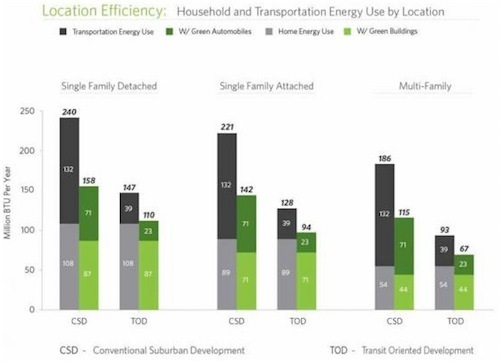Matthew Yglesias's Blog, page 2404
March 2, 2011
Green Buildings: Meh
Via Lydia DePillis, the latest study to indicate that building location is more important than "green" architecture in determining its ecological footprint:

I think that if you extend this to include more factors, you'll see that location looks even more central. My house is more efficient to heat than a suburban house in Loudon County, and it would be even more efficient to heat if we picked it up and moved it to Los Angeles where it's warm. Allowing denser construction near transit nodes, in walkable areas, in downtown-adjacent neighborhoods, and in places with mild weather are the "greenest" things we can do for the built environment.


The Dual Function of Labor Unions
RJ is asking the tough questions:
As someone who is sympathetic to collective bargaining rights, and is happy that unions exist as a strong political force for ordinary working people, I still occasionally have a tough time with the dual mission of large, national labor unions. Can you attempt to make the case for an organization that both (1) represents the interests of workers in contract negotiations with employers AND (2) gives moral and financial support to causes and politicians with platforms that align with the perceived views of their members? I understand the importance of solidarity in avoiding race-to-the-bottom situations, but it does seem that using union dues to support political candidates is, at least, a separate function that requires some rationale beyond "we care about workers."
I don't think there's a great answer to this question except to observe that it exists on a perfectly general level. What's the case for trade associations? I can't think of one. If there were some way to prevent large movie studios from teaming up to hire Chris Dodd to mount political campaigns on their behalf, American public policy would improve. But it's a free country. So insofar as people are allowed to form organizations for collective purposes, they also set about lobbying and propagandizing on their own behalf. In this regard, I actually think public sector labor unions make much less of a difference than their critics seem to think. It's not like there's nobody out there lobbying for high and sometimes inefficient levels of Medicare spending. I sometimes wonder what conservatives would say if the American Medical Association renamed itself the International Brotherhood of Doctors or if the National Education Association started calling itself a "professional associations" rather than a labor union.
At any rate given that private sector unions show absolutely no sign of suddenly reviving as a major force in the American economy, I think wondering whether or not it makes sense in the abstract to combine the collective bargaining and political activism functions is a bit besides the point. The question is what ideas can progressives come up with of other models of how to engage people in the political process? What other kinds of institutions can be built? It's clearly possible to engage large numbers of people in activism around gay rights, or to get abortion banned or kept legal, and we have a large environmental movement in the United States. Is it inconceivable that citizens could organize on behalf of progressive economic ideas outside the context of a labor union?


What Does "Waste" Mean to Voters?

A new poll (PDF) is being widely cited as evidence of public misconceptions about the federal budget. For example:
There are widespread misperceptions about the state of the federal budget. A majority of voters incorrectly believes the federal government spends more on defense/foreign aid than it does on Medicare and Social Security (63%). Also, a similar majority (60%) incorrectly believes problems with the federal budget can be fixed by just eliminating waste, fraud and abuse. Voters do not casually agree with these untruths—at least 40% strongly agree. Further, less than half (44%) believe Medicare and Social Security costs are a major source of problems for the federal budget (49% disagree).
Obviously, this is mistaken. For Social Security to pay promised benefits will require a small increase in Social Security taxes. For Medicare to pay promised benefits is essentially impossible absent a radical change in the cost structure of American health care. And for the Social Security Trust Fund debt to be fully repaid will require either substantial new taxes or substantial cutbacks in "discretionary" spending. But what about the waste? Everyone in Washington knows this is BS and there's actually very little money to be found in waste fraud and abuse.
But the public disagrees:
The waste in government is a strong concern to voters – again 60% believe fixing the waste will solve the nation's budget problems, and voters say that a mean of 42% of each federal dollar is wasted.
I think the best way to understand this is probably with a principle of generous interpretation. A liberal might say "I don't see why we're wasting all this money in Afghanistan." That's not to say that all the money being spent is "waste." It's mostly paying salaries and benefits to soldiers and their dependents, it's hiring contractors to do real work, it's buying bullets and robots and chocolate milk and TGI Friday's. That's not "waste" in a budgetspeak sense. But you still might say that the money is wasted on an activity with little value.
The problem here is that one man's waste is another man's vital public service. I think the federal governments wastes too much money subsidizing rural lifestyles. I imagine that Senators from Kansas will disagree. They probably think the government should stop wasting money on mass transit. The evidence is clear that a lot of Medicare spending is wasteful in the sense that it does little to produce good health outcomes, but if you ask the congressman in whose district some high-cost low-utility device is made in, he's not going to see it that way.


George Will Makes The Case For Heavy Automobile Subsidies

(cc photo by richardmasoner)
Sarah Goodyear marvels over George Will's allegation that high speed rail is actually a mind control plot:
To progressives, the best thing about railroads is that people riding them are not in automobiles, which are subversive of the deference on which progressivism depends. Automobiles go hither and yon, wherever and whenever the driver desires, without timetables. Automobiles encourage people to think they—unsupervised, untutored, and unscripted—are masters of their fates. The automobile encourages people in delusions of adequacy, which make them resistant to government by experts who know what choices people should make.
Taken logically, this doesn't make very much sense. Intercity passenger rail is primarily an alternative to airplanes, and to intercity buses not to cars. If Amtrak disappeared tomorrow, people still wouldn't want to drive from Boston to Manhattan and end up paying through the nose for parking.
But I do think this is a good look into the psychology of conservatives. Maybe high-speed rail is a waste of money and maybe it isn't. I think it's plausible to say we should just spend the cash on better regular mass transit or whatever. But I've long struggled to explain the right-wing's affection for status quo American policies that amount to massive subsidization of the automobile. A small slice of that is spending on roads. A much larger amount is minimum lot size rules, parking mandates, the whole shebang. It's a bit odd, and my instinct had been to say that this just goes to show that conservatism has nothing to do with free markets and everything to do with the identity politics of middle aged white suburban conformists. But Will offers another explanation here. Automobile use is not a sign of the free market, but an actual cause of it. Driving inculcates habits of freedom, and thus coercive pro-car regulations are, in a way, freedom-promoting.


March 1, 2011
Endgame
The problem is you:
— Nancy Pelosi's against styrofoam cups, so conservatives .
— Scott Walker's plummeting poll numbers.
— The voters want small class sizes.
— Fetus scheduled to testify at Ohio legislative hearing.
— "Indians and Chinese, by contrast, have drunk their own Kool Aid.".
— We need market pricing of helium (bigger deal than it sounds).
For Newt Gingrich's presidential campaign, Liz Phair "Divorce Song".


The Social Conservatism Of The Damned
This is apropos of not much more than reader mail, but when examining social conservative hostility to gay and lesbian equality I think it's critical to highlight how lazy it is. Social conservatism places a number of stringent demands on people's sexual behavior. It tells them to avoid premarital sex, it tells them to avoid infidelity to their spouse, it tells them to avoid divorce. This is hard stuff. Some people live up to it. But most don't. It's a rigorous moral code by whose light many people are failing, and the vast majority of non-failures will nonetheless struggle mightily with it.
By contrast, "don't make out with another dude" is really easy for most dudes. It's very hard for some, of course, but most people aren't gay and thus have absolutely no difficulty adhering to moral injunctions against gayness. A political movement that ran around talking about the sanctity of marriage and how divorce should be illegal and divorced people should be disgraced and run out of public life would have trouble catching fire. But almost everyone can stand up for "traditional morality" on the cheap by heaping scorn on a relatively small minority.


Chris Dodd Cashing In With The Movies

There was pretty overwhelming sentiment that Chris Dodd would find his post-Senatorial career as some kind of lobbyist for the insurance or finance industries, so I'm pretty surprised to learn that he'll be heading up the Motion Picture Association of America instead. Apparently "the job will require Mr. Dodd to push a Hollywood agenda in Washington that includes a more aggressive governmental stance against piracy and prodding China to lift limits on the distribution of Western movies."
China should, in fact, lift limits on the distribution of Western movies and the US government ought to press them to do it.
As for "piracy," I think the recent murder of Americans by actual Somali pirates should drive home how absurd it is to analogize unauthorized copying of a non-rival good to violent kidnapping and robbery. Nobody dies when you download a copy of Little Fockers. So it's always worth asking what pressing social problem stepped up anti-infringement measures are intended to solve. Is America a country with an unusually low violent crime rate, such that it makes sense to divert more law enforcement resources away from such matters? Do Americans have too much disposable income, so we're looking to raise the cost of entertainment? It's actually quite true that real wages for movie stars have been declining in recent years, so maybe this is the issue Dodd wants to address.


The Kochs and the Commons

Charles Koch claims to be very upset about "crony capitalism" (albeit willing to benefit from it personally), but the real triumph of the Koch Brothers and their ilk is in branding the line of work they're in as any kind of capitalism at all.
Suppose I had a business where what I do is find people who live in flood prone areas and threaten to wreck their houses unless they pay me money. That would be called an extortion racket, not capitalism. I don't own those people's houses. Real capitalism requires the government to restrain me from knocking the houses down. Similarly, I can't just stand in the middle of a busy intersection, cause a traffic jam, and then shout "free market" when the cops try to take me away. After all, I don't own the intersection any more than I own your house. So what about Koch Industries and its substantial fossil fuel interests. Do they own the air? Do they own the homes of people in flood-prone areas? To the best of my knowledge, that's not the case. Charles Koch no more owns the air than I own his house or the interstate highway system. So why is "Koch Industries is allowed to spew whatever it wants into the air" considered a free market position? In part, it's a misunderstanding. But to a much larger extent it's a branding triumph. The basic point about pollution and regulation was understood by classical economists and political theorists, was understood by Hayek, is understood by right-of-center politicians in Europe, etc. But in America, things are different, and that's in large part a triumph of some very self-interested philanthropy.
Someone who took the ideas of private property and free markets seriously would be jumping up and down with his head on fire about coal and oil companies wrecking an atmosphere they don't own and refuse to pay for.


An Army Marches On Its Stomach

Kristen Hinman on the US military's unhealthy meal plans:
Take the Army. Its food program mandates that soldiers have access to eggs-made-to-order, three types of bread, three types of meat, six kinds of cereal, no fewer than one potato dish, and at least one pastry at breakfast alone. At least two hot entrees, with one sauce or gravy, must be offered at lunch and dinner, along with a deli bar featuring three types of meat; a short-order grill with four items; "two additional hot short-order entrees (pizza, fried chicken, and so forth)"; French fries; onion rings; assorted chips and pretzels, and at least four desserts. These are minimum standards. The Marine Corps is much the same. Chocolate milk is mandated at every Marine meal, and four types of soda must flow at lunch and dinner. Marine bases with funds available for takeout containers are encouraged to serve hamburgers, cheeseburgers, hot dogs, and French fries from the griddle at lunch, dinner and breakfast.
This all-you-can-eat style of chow-hall is a relatively new model. For most of the 20th century, the menus were more Spartan, with one or two options for meat, starch, and vegetables. But after the draft was rescinded, military brass began to think of service members more like customers; a certain quality of life was considered necessary to keeping a fast-food nation enlisted, and the food-court model took over. At the same time, a parallel food universe evolved alongside the government-funded mess halls. Franchises like Taco Bell and KFC moved onto bases; vending machines stocked with candy and energy drinks were installed in barracks. After the Iraq war began in 2003, fast food became available in combat zones.
I feel like there's something oddly unserious about an imperial project that involves the construction of a TGI Friday's in Kandahar.


Supermajority Rules: Use 'Em When You Got 'Em

(cc photo by kevindooley)
SR writes: "Does your disdain of the US Senate filibuster spillover to Wisconsin Senate Democrats abuse of the quorum rule?"
This kind of stuff is just dumb. Given that the filibuster should be abolished, do I think members of the Senate should filibuster bad bills? Of course they should. Your job as a legislator is to try to pass good bills and block bad ones. The real question highlighted by the Wisconsin standoff is for filibuster fans. If routine supermajorities are great for the US Senate, then the Wisconsin State Senate provide for them? How about Nebraska? What's so different about the US Congress that routine supermajorities are good idea there but not for state legislatures and city councils all around the country?
At any rate, if I were writing a state constitution I would try to minimize the possibility of quorum hijinks. But the good news about quorum hijinks is that you can't pull this kind of stunt on a routine basis, it seems require the holdouts to bear substantial personal costs in a manner that deters its constant application. But it's possible that things will change and state legislators will start pulling this stuff all the time, which would be bad.


Matthew Yglesias's Blog
- Matthew Yglesias's profile
- 72 followers



